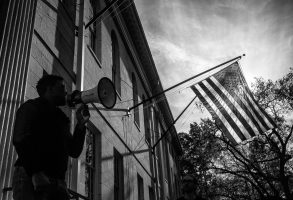
Published June 14, 2018
Thanksgiving is easily my favorite American holiday. But I think you could argue that the most American of the American holidays might well be the semi-official birthday of the flag we celebrate today.
Many countries have an independence day or some celebration of their founding or re-founding on the calendar. But no country celebrates its flag quite like we do. Our national anthem is basically a song about our flag. Millions of schoolchildren start each day by pledging allegiance “to the flag of the United States of America” even before they pledge it “to the republic for which it stands.”
We celebrate the flag on this particular day because it was on June 14, 1777, that the Continental Congress interrupted its urgent debates about the conduct of the war to pass a short resolution that read:
Resolved, That the flag of the thirteen United States be thirteen stripes, alternate red and white: that the union be thirteen stars, white in a blue field, representing a new constellation.
No one seems to know whose idea this resolution was; we only know it passed quickly, and with no recorded debate. And it’s not entirely clear how this vague resolution led to the specific design and dimensions of our first flag (or whether it might have actually been a description of an already existing design). But the familiar 13-starred version was our flag until 1795, when Congress began its practice of adding stars (and at first also stripes) to recognize newly admitted states. In 1818, Congress passed a law returning the flag to its original 13 stripes, and requiring that a new star be added to recognize each new state — with the revised flag taking effect on the Fourth of July following that state’s admission to the union. And that is how we got the flag we know.
Its birthday hasn’t been celebrated from the start. Woodrow Wilson seems to have been the first president to issue a Flag Day proclamation, and Congress made it formal only in 1949, with another distinctly American move: They didn’t mandate a formal holiday (and Flag Day is not a formal holiday), but rather set in motion a series of suggestions. They passed a law requesting the president to annually issue a proclamation urging the public to observe the flag’s anniversary. It’s hard not to love our system of government.
And it does seem to me that in this moment in particular — a time when the question of the very nature of American patriotism and nationalism is much in the air — the flag can offer us one path through challenging terrain. The flag belongs to no party or faction but to all of us. And it belongs to us as a symbol. It’s not a document that makes an argument, but it’s also not the soil of the land or the blood of the people. It’s a symbol that lets us take in both the idea of America and the reality of it, both the history and its meaning, both the substance and the spirit.
In a speech delivered to Brooklyn’s 14th Regiment as it prepared to depart for battle in the Civil War in 1861, the great abolitionist preacher Henry Ward Beecher told the soldiers to keep their eyes on their country’s flag for this reason. He concluded his remarks with some thoughts on what the symbol that is the flag actually symbolizes:
Our flag means, then, all that our fathers meant in the Revolutionary War; it means all that the Declaration of Independence meant; it means all that the Constitution of our people, organizing for justice, for liberty, and for happiness, meant. Our flag carries American ideas, American history and American feelings. Beginning with the Colonies, and coming down to our time, in its sacred heraldry, in its glorious insignia, it has gathered and stored chiefly this supreme idea: Divine right of liberty in man. Every color means liberty; every thread means liberty; every form of star and beam or stripe of light means liberty: not lawlessness, not license; but organized, institutional liberty, — liberty through law, and laws for liberty! . . .
Accept it, then, in all its fullness of meaning. It is not a painted rag. It is a whole national history. It is the Constitution. It is the government. It is the free people that stand in the government on the Constitution. Forget not what it means; and for the sake of its ideas, be true to your country’s flag.
Amen. And happy Flag Day.
— Yuval Levin is the editor of National Affairs and a fellow at the Ethics and Public Policy Center.








